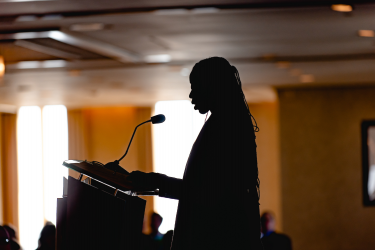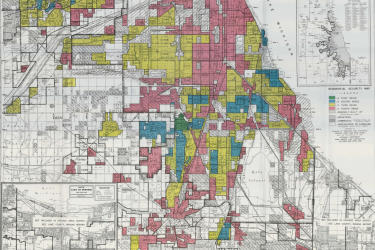Advocating for Affordable and Equitable Homeownership
Decades of discriminatory and racist housing practices have made Chicago’s Black-White homeownership gap the largest among the nation’s ten biggest metropolitan areas, according to the Urban Institute.1
- "We Will Chicago" plan, Housing & Neighborhood pillar, July 2022
According to the Bureau of the Census in 1960, of the ten largest cities, Chicago had a greater percentage of substandard housing of any except St. Louis. Forty-one percent of all Negro families in Chicago were reported living in dwellings that were dilapidated, deteriorating, or lacking in plumbing facilities.2
- Dr. Martin Luther King, Jr., Chicago, March 1966
Fifty-six years spans these two quotes about the state of housing in Chicago, and it seems little has changed.
When Dr. Martin Luther King, Jr,. delivered his speech to a crowd of 14,000 Chicagoans that day in March 1966, he was adamant that sub-par living conditions were a sign of second-class citizenship. His words still ring true half a century later: “For in reality, the slum is a community without the power to determine its own destiny...only as this nonpartisan moral force speak its voice, can we be sure that truly democratic 3 government services [are delivered] in our cities.” 4
The need for affordable, sustainable, and decent housing in this country has reached fever pitch.5 The growing gap in affordable housing options not only affects Black and Latino families who have moved to historically urban centers such as Chicago, New York City, St. Louis, and Los Angeles, but also rural White families in long-forgotten counties ravaged by de-industrialization and poor policy choices.6,7
Continued migration patterns due to the rising costs of living have put new stress on emerging urban centers like Atlanta, Phoenix, and Tampa.8 Millennial adults from middle-class and upper middle-class families now have to navigate a treacherous and often unforgiving housing dearth that was already plaguing our fellow U.S. citizens 56 years ago.9
These statistics were my point of reference when I landed in Washington, D.C., for the 2023 Habitat on the Hill conference in early February. The buzz and excitement were palpable from the opening moments of the gathering. Over 350 people representing 1,100 different Habitat affiliates arrived in our nation’s capital to learn more about housing policy and advocate for affordable homeownership.
The workshop portion of the conference focused on different aspects of the affordable homeownership landscape, from property tax relief to media relations to advancing Black homeownership. These sessions helped us understand the complex details of federal legislation and local tax policy and equipped us for the advocacy work ahead.
The culminating event were congressional meetings on the Hill. My advocacy team and I spoke with U.S. Representatives including Rep. Robin Kelly (IL-2) and Rep. Jonathan Jackson (IL-1), who were excited to hear about how Habitat Chicago is playing a role in developing healthy neighborhoods through new home construction and our Neighborhood Grant Initiative.10
As a native Chicagoan and PROUD South Sider, I know all too well about the dire need for affordable homeownership and the generational benefits it affords families. The euphoria and sense of being rooted-in-place when one turns the key to their home is almost inexplicable and expands the notion of neighbor and citizenship. It's why I work at Habitat Chicago.
So, where can you plug in? Volunteer with Habitat Chicago. Become a part of our robust and diverse volunteer corps and learn how you can advocate for and support more equitable homeownership. A motto that is often heard in community-based organizations really does begin to capture how we complete this work: “If you want to go fast, go alone. If you want to go far, go together.”
Let's advocate for affordable homeownership in Chicago together.
Stephen P. Readus
Neighborhood Engagement Manager
Habitat Chicago
1 Housing and Neighborhoods. (n.d.). We Will Chicago. Retrieved March 22, 2023, from https://wewillchicago.com/housing-and-neighborhoods/
2 King, M. L. (1966, March 12). Address to Chicago Freedom Festival [Speech Address to Chicago Freedom Festival].
3 Democracy, Human Rights, and Governance | U.S. Agency for International Development. (2021, October 4). Www.usaid.gov. https://www.usaid.gov/democracy#:~:text=Democratic%20Governance%20%2D%20Building%20open%2C%20responsive
4 King, M. L. (1966, March 12). Address to Chicago Freedom Festival [Speech Address to Chicago Freedom Festival].
5 The State of the Nation’s Housing 2022 | Joint Center for Housing Studies. (n.d.). Www.jchs.harvard.edu. https://www.jchs.harvard.edu/state-nations-housing-2022
6 Stern, D. (2018, September 6). Rural America is Losing its Affordable Rental Housing. Housing Assistance Council. https://ruralhome.org/rural-america-is-losing-its-affordable-rental-housing/
7 Pytalski, T. S., Jan. (2023, March 15). Tackling Rural America’s “Hidden” Housing Crisis. The Daily Yonder. https://dailyyonder.com/tackling-rural-americas-hidden-housing-crisis/2023/03/15/
8 The State of the Nation’s Housing 2022 | Joint Center for Housing Studies. (n.d.). Www.jchs.harvard.edu. https://www.jchs.harvard.edu/state-nations-housing-2022
9 Dickerson, A. M. (2016). Millennials, Affordable Housing, and the Future of Homeownership. Journal of Affordable Housing & Community Development Law, 24(3), 435–465. http://www.jstor.org/stable/26427305
10 NEIGHBORHOOD GRANTS INITIATIVE OVERVIEW | Habitat for Humanity Chicago. (n.d.). Www.habitatchicago.org. Retrieved March 22, 2023, from https://www.habitatchicago.org/grants/info

